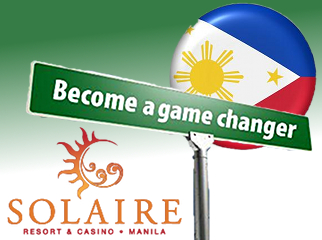 When Phase 1 of Bloomberry Resorts’ Solaire Manila resort-casino opens this Saturday, gaming industry observers will be watching with great interest as to how the first of four planned Entertainment City casinos performs. Solaire has made little secret of its intention to lure VIP gamblers away from other regional gaming hubs like Macau and Singapore. Roughly one-third of Solaire’s 300 gaming tables will be allocated to high-rollers, and 61 of these will be allocated to junket operators.
When Phase 1 of Bloomberry Resorts’ Solaire Manila resort-casino opens this Saturday, gaming industry observers will be watching with great interest as to how the first of four planned Entertainment City casinos performs. Solaire has made little secret of its intention to lure VIP gamblers away from other regional gaming hubs like Macau and Singapore. Roughly one-third of Solaire’s 300 gaming tables will be allocated to high-rollers, and 61 of these will be allocated to junket operators.
In December, Bloomberry’s billionaire boss Enrique Razon revealed that the company was in discussions with over two-dozen junkets about steering VIPs towards Manila. Contracts have since been signed with at least seven of these junketeers. Loraine Koo, Solaire’s VP for biz-dev and VIP services, estimates junkets will be responsible for 60% of the casino’s premium player business.
Solaire’s gaming operations are being overseen by Global Gaming Asset Management (GGAM), the Nevada-based firm run by former Las Vegas Sands president William Weidner (also head of Weidner Resorts, which is pushing hard for its own casino project in Taiwan). GGAM president Bradley Stone says Solaire expects to reap 45% of its gaming revenue from VIPs. Stone told Bloomberg that Razon understood that “this will really be the first time that the Philippines is going after the premium player.” Thanks to a favorable tax rate for VIP gamblers (15% vs. Macau’s 40% and Singapore’s 12% – 22%), “Manila has the opportunity to be competitive and to get its share of that business.”
At a media briefing on Thursday, Solaire COO Michael French referenced this tax rate when he credited the Philippine government with having “created incentives for us to go out and recruit VIP players and international customers.” Nonetheless, French expects 70% of the resort’s customers to be locals in the first year of operation. That figure will drop to 55% as word spreads across the Asia-Pacific zone that there’s a new gaming option within four-hours flying time of most cities in the region.
Dennis Andreaci, Solaire’s senior VP for gaming operations, believes “maybe close to 50%” of Solaire’s revenues will come from high-rollers, but that it would probably take six months before the casino becomes firmly established in VIP gamblers’ minds as a viable option. Koo said low-tier VIPs would be expected to spend P2.5m (US $61.5k) per visit, whereas the upper crust VIPs would likely drop P50m ($1.23m) during each stay.
Nothing is too good for these mega-high-rollers. While Bloomberry has done a good job in convincing around 450 Filipino ex-pats with experience working at casinos in Macau and Singapore to come home to work at Solaire, Malaya.com reported that Razon has also hired 27 Chinese card dealers after some high-rollers related how they feel more comfortable interacting not just with Mandarin-speakers but with their countrymen in general.
Bloomberry recently secured $352.5m in financing to help pay for the construction of Solaire’s Phase 1A, which is set to open in Q3 2014. French says plans have been drawn up for Solaire’s succeeding phases, but “we can’t decide on anything right now until we see” how the casino’s Phase 1 performs. Metropolitan Bank & Trust Co.’s Allan Yu told Bloomberg that Solaire was under the microscope “because it can prove if the Philippines can get a bigger share of junket and VIP market in Asia. It’s very promising and it looks like it’s going to take off.”
Small wonder then, that French says the company plans to spend $1m to make sure Solaire’s opening day festivities are memorable. “We will become the gateway of gaming to the Philippines. We’re setting a new standard, that’s why our slogan is ‘the game changer.’” Game on!
